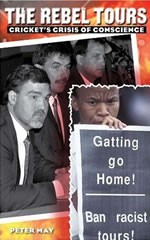The Rebel Tours
Martin Chandler |Published: 2009
Pages: 344
Author: May, Peter
Publisher: Sportsbooks
Rating: 4 stars

It is almost twenty years since South Africa began playing Test cricket again following an exile that began in 1970. There is therefore a generation of followers of the game who have never known a time when South Africa was not a Test-playing nation. The cricket that was played in South Africa during the 1970’s and 1980’s is all but forgotten which might, in some ways, seem surprising when it is remembered that the “South African issue” regularly made the front page of newspapers in an era when only Ian Botham’s heroics in 1981 promoted the sport from the back page.
Inevitably it was the politics as much as the sport that achieved headline status and the subsequent disappearance of the issue demonstrates how, in the long term, sport is so much more memorable than politics. Any new supporter of cricket today who has even the briefest acquaintance with the sport’s history will have an idea of what happened in the 1981 Ashes Series but not many will have heard of the “Gleneagles Agreement”, the accord reached between Commonwealth nations to discourage sporting links with South Africa and the blacklist of sportsmen who had links with that country which flowed from it.
Peter May’s book faithfully sets out the history of the subject and dispassionately prepares the reader for the main part of his work which is an account of the private tours of English, Sir Lankan, West Indian and Australian cricketers that took place in the 1980’s as an attempt, largely unsuccessful, to enable the South African public to enjoy International cricket. The cricket is described and, helpfully, there are scorecards of all the major matches, but other than some of the matches against the West Indians the interest in these tour accounts is not in the cricket itself but the moral and political considerations that surrounded them.
A disappointing, albeit unsurprising facet of the book is the reluctance of those involved to talk to May. It is doubtless best explained by unease at having participated at all coupled with a desire not to reopen old wounds. The word mercenary may, in respect of professional sportsmen simply trying to earn a living in a situation where businessmen had no barriers in their way, be seen to be harsh but, as May’s writing reminds us, sport is not the same as business and if shame and regret is felt now that must surely be a case of those concerned reaping what they have sown. Despite this absence of as much first hand testimony as a reader would like to see May has made extensive use of contemporary reports and if the participants feelings now are not the same as they were when they opened their mouths in the eighties then they only have themselves to blame if they feel they are being misrepresented.
These tours do little credit to anyone who was involved but their story is important on many levels and Peter May has done cricket a great service by writing this account. Both author and publisher deserve acclaim and healthy sales for this book although while I have no doubt they will receive the former I am more doubtful about the latter. The primacy of official Test cricket, while periodically fretted over, is absolute. World Series Cricket, which at least produced some superb cricket from men who were the best in the world, was forgotten almost as soon as it was over and is just a curiosity today. The rebel tours, lacking WSC’s redeeming features, are the same but, as with WSC, the lessons learned from the whole affair must never be forgotten. Gideon Haigh’s seminal work “The Cricket War” made sure that the game’s literature has a definitive record of WSC. Peter May has done the same for South Africa’s years in the cricketing wilderness.






Leave a comment